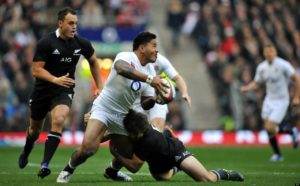With 12 years of coaching experience in the Southern Hemisphere between them, Mike Penistone and Will Eggleston examine some areas where there is a difference between the Northern Hemisphere (“NH“) and the Southern Hemisphere (“SH“) approach to playing rugby.
The player
 Generally the SH player expects a session of intensity and dynamism with a focus on correct technique. A session with evidence of well thought out coaching practices. A session conducted at high speed throughout.
Generally the SH player expects a session of intensity and dynamism with a focus on correct technique. A session with evidence of well thought out coaching practices. A session conducted at high speed throughout.
SH players want more out of the coach, “how can you improve my performance?” He is more likely to ask direct questions throughout the practices and want answers.
This can be quite abrupt at times and puts pressure on the coach to produce relevant practices that challenge the players at every session. There is also a lack of on field passion and enthusiasm for the player who makes a momentum changing contribution in the NH, such as creating a turn–over on your own line. Players in the SH are quick to show their appreciation, running in, back slapping, etc. A real celebration and emotional expression of how much your contribution means to the team.
The practice session
In order to win the game on Saturday there has to be effective transfer from the practice ground to the game field. The practice session has to be conducted at pace with an emphasis on the execution of perfect technique. Therefore all sessions have to include work on key technical and skill competencies. Sessions may contain at least 15 minutes work on individual positional skill, as well as the individual players X factor.
The duration of the session is not important, but the quality and relevance of the practices is. It is good to finish all sessions with competitive games, related to the practices of the session. Winning has to be a permanent component of all practices, finish the sessions on a high.
Creating maximum pressure in attack
SH players are confident in their ability to use the ball and are constantly wanting to ask questions of the defence, by moving the ball quickly to different parts of the field.
The production of quick ball, (ruck speed), supports this style of play and ensures a positive approach to skill development at training sessions.
This style of attack based on quickness, a high level of skill and deception, demands involvement from all team-mates; primarily in understanding lines of running and the value of inside support, which in itself encourages the ball carrier to carry the ball in both hands.
The attacking process has to contribute to go-forward, which applies maximising pressure to the defence. All players are involved in team play so working off the ball is vital at all times.
The excitement and enjoyment generated through creating pressure in attack, ensures that maximum effort will be used in getting the ball back, (turnover) if it is lost or stolen, thereby reverting to creating maximum pressure on the defence. A passionate desire to attack will intensify the commitment to defend and re-start the attacking process.
Understanding team play
It is important that each player is aware of his contribution to the team. Choosing when to and when not to make a contribution is important. Players should be aware of their team mates’ contribution in a pattern that might produce a score and of his team mates’ limitations.
The current All Black back line has players who can contribute collectively or individually. They are prepared to break the pattern when they see an opportunity to demonstrate their skill set to the benefit of the team. In the red zone (10 meters from the try line) there is a distinct lack of urgency and creativity in NH attack.
Attacking in the red zone switches the defence on, so a process approach to attack is more important than an outcome approach. By having a number of attacking processes, opportunity to score will present itself.
Urgency-positioning-composure-weight of pass and accuracy will help create opportunities to score. How often do we see repeated pick and drive fail in desperate attempts to score.
Conditioning
A leaner athlete is needed to play a fast mobile support based game. The All Blacks have team mobility. All players are support players and all work off the ball. To play this way requires a positive approach to the relationship between running-quality technique- execution and re-involvement.
How quickly do your players get off the ground? How many players do you have on their feet? Do your players react quickly?
In a recent test match Brody Retallick took the ball into contact, drove forward, executed perfectly the long place, got back to his feet quickly and latched on to the next player who had picked the ball up and gone into contact, then Retallick drove him forward.
Players should always support the ball carrier in anticipation of receiving a pass. The ball carrier plays at pace knowing someone will always be on hand to receive a pass.
If you want to play this way, you have to train this way!
Competition & “have a go” mentality
In all aspects of play, compete and back your skill set.
Finish training sessions with some form of competition, be it individual, unit, team or mixed groups. Don’t restrict the players.
A fast attack, one touch 10 v 6 from half way to try line, between the 15 meter lines will allow for team play as well as individual virtuosity. You get one shot at the title, make an error and its over! Use a stop watch to time how long each group takes to score! Above all let the players have this time!
Then it might be your time (to coach) on match day?








 When most people hear the word “Peloton” they think of an expensive black bike with shiny red buttons and that controversial commercial where the husband gifted his wife a Peloton for Christmas.
When most people hear the word “Peloton” they think of an expensive black bike with shiny red buttons and that controversial commercial where the husband gifted his wife a Peloton for Christmas. If the app interests you, Peloton is currently offering a 30 day FREE TRIAL, so why not give it a try? Check it out
If the app interests you, Peloton is currently offering a 30 day FREE TRIAL, so why not give it a try? Check it out 

 This article would not be complete, however, if we did not acknowledge some of the delivery issues that have been plaguing Peloton over the last year. Most of the delivery issues seem to affect U.S. deliveries, however, the UK deliveries have been affected as well.
This article would not be complete, however, if we did not acknowledge some of the delivery issues that have been plaguing Peloton over the last year. Most of the delivery issues seem to affect U.S. deliveries, however, the UK deliveries have been affected as well.







